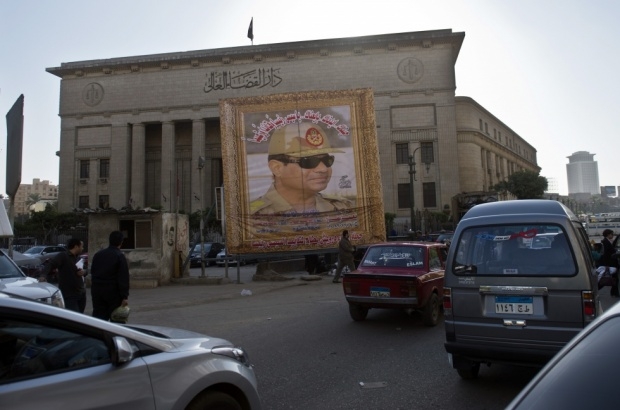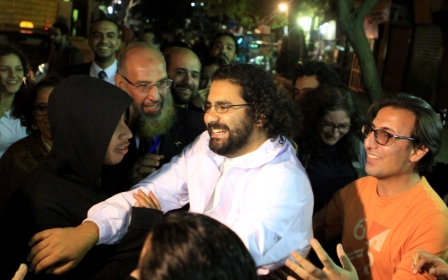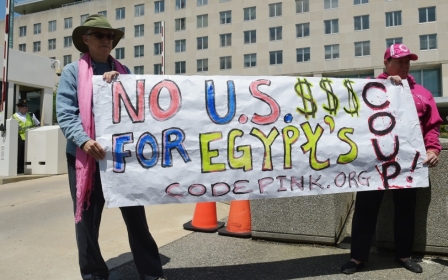Egypt to try 200 alleged militants for 'terrorism'

Egypt's prosecutor general Saturday referred to trial 200 alleged members of the Al-Qaeda-inspired Ansar Beit al-Maqdis, accusing them of "terrorism" for launching deadly attacks against security forces, judicial sources said.
It would be the first mass trial of jihadists in Egypt since the military deposed Islamist president Mohamed Morsi in July last year.
The Sinai-based Ansar Beit al-Maqdis, or the Partisans of Jerusalem, has claimed responsibility for some of the bloodiest attacks against Egypt's security forces since Morsi's overthrow.
The date for the trial has yet to be fixed, but of the 200 accused, 102 are in custody and the rest are on the run, the sources said.
Those who face trial are accused of "belonging to a terrorist group, espionage on behalf of (the Palestinian movement) Hamas, criminal attacks, and terrorism," including deadly bombings targeting police headquarters in Cairo, Mansoura in the Nile Delta and South Sinai.
New MEE newsletter: Jerusalem Dispatch
Sign up to get the latest insights and analysis on Israel-Palestine, alongside Turkey Unpacked and other MEE newsletters
They are also accused of killing three high-ranking police officials, among them an aide to interior minister Mohamed Ibrahim who himself was targeted by a suicide car bomb in September last year.
The attacks allegedly carried out by the accused, who include some operational leaders, resulted in the deaths of 40 policemen and 14 civilians, the sources said, adding another 348 were wounded.
According to the charges, investigators also found the accused had been in touch with Morsi during his presidency, the sources said.
The military-installed authorities have previously accused Morsi's Muslim Brotherhood of having links to Ansar Beit al-Maqdis.
Egypt has been rocked by a wave of militant attacks since Morsi's overthrow, with Ansar Beit al-Maqdis carrying out bombings and shootings in the Sinai Peninsula, Cairo and the Nile Delta.
The group had also claimed the killing of five soldiers when it shot down a military helicopter in the restive Sinai on January 24, a day before the third anniversary of the revolt against long-time autocrat Hosni Mubarak.
Ansar Beit al-Maqdis has been declared as a "terrorist group" by Egypt, the United States and Britain.
Fair trials?
However, a wave of mass sentences in Egypt, including hundreds sentenced to death recently after a rushed mass trial, had sparked charges that military-installed authorities are using the judiciary as a blunt tool of repression.
On a near-daily basis, new trials open before being swiftly adjourned, with lawyers and human rights activists baffled by the sentencing of dozens or even hundreds of defendants based on evidence that is rarely made public.
Since the army ousted Morsi, Egypt's first democratically elected president, in July amid a wave of protests against him, a security crackdown targeting his supporters has left more than 1,400 killed and 15,000 jailed.
Hundreds of Morsi's supporters have been sentenced to death or life imprisonment, and dozens more have gotten hefty jail terms.
In one case, 14 young women were given 11 years in jail for taking part in a pro-Morsi protest. The sentence was later reduced on appeal to a one-year suspended sentence, however, and seven girls, initially sentenced to juvenile detention, were ordered freed.
In recent months the crackdown has been extended to non-Islamist activists -- including many who backed the overthrow of Morsi -- following illegal protests against the military-installed authorities.
Even before the sentencing phase, Egyptian court proceedings are frequently marred by shouting matches involving lawyers and journalists, with police conscripts physically separating the two groups.
At the opening of one of Morsi's trials, local journalists chanted "Execution!"
The military-installed authorities have stood by the judiciary, insisting it is independent, but top officials have privately admitted to being embarrassed by overzealous judges.
During his year in power, Morsi had sought to sideline judges loyal to strongman Hosni Mubarak, who was toppled by a popular uprising in 2011, and some analysts believe the judges are now settling scores.
"The majority of judges are today an arm of the current power, and not an independent institution," and courts are used to "disguise the repression through political trials that are not built on law," said Gamal Eid, a prominent human rights lawyer.
Middle East Eye delivers independent and unrivalled coverage and analysis of the Middle East, North Africa and beyond. To learn more about republishing this content and the associated fees, please fill out this form. More about MEE can be found here.




